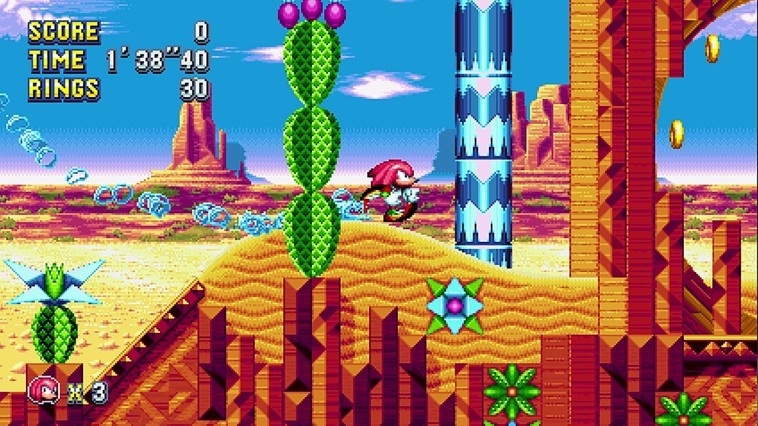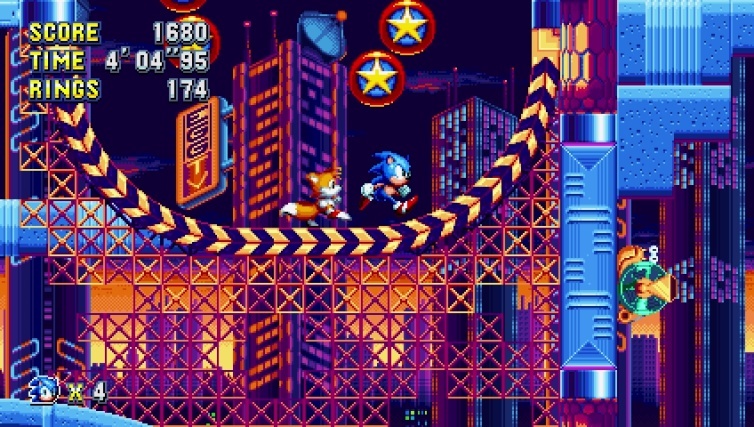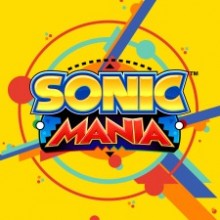Sonic Mania (PlayStation 4) Review
By Gabriel Jones  21.08.2017
21.08.2017

The Phantom Ruby, a gemstone filled with unimaginable power, has fallen into Eggman's clutches. Sonic makes a valiant attempt to stop him, but he becomes the first target of the mysterious rock. Flung through time and space, the hero recovers only to find himself in the Green Hill Zone. Is this the past, or is it another dimension? In any case, the lush hills and valleys are quite a bit different than he remembers. Nevertheless, the speedy hedgehog must travel through realms both known and unknown to stop his arch nemesis.
Typically, videogame criticism is treated as merely a blunt instrument. All anyone cares to know is whether or not a game is good. The information that leads to that conclusion usually goes ignored. The Sonic the Hedgehog franchise is a perfect example. Most of the releases are…well…simply terrible. There's plenty of critical discussion to be had, but almost everything of substance is inexplicably filtered out. By the time a new Sonic title is announced, the developer has already decided on a vision. That vision tends to either be speed, AKA "Gotta go fast," or nostalgia. One could almost be led to believe that if a new Sonic videogame is fast and features the always-memorable Green Hill Zone, then it's already halfway to being good. Is that ever really true?
With the passing of years, people have started to forget what makes a Sonic game great. Perhaps they were mistaken, and the franchise was never any good in the first place. Still, it's hard to let go of the past - or rather, this feeling of wonderment that was first felt back in 1991, with the original release of Sonic the Hedgehog. It was an utterly surreal adventure, presented almost entirely without context. Rather than speed, this platformer emphasised control. It created a world that gradually became more hostile. While it was possible to run through the danger, those who took the time to explore the freedom of movement were treated to something quite incredible.

While most of the sequels focused on refining and iterating upon the original, the black sheep is, in this critic's view, the most fascinating of them all. Sonic CD pushed back against the vision of its predecessor. Past, present, and future collide to create dissonant worlds. Early on, the player senses that they're not welcome. This becomes readily apparent in the later zones, which make every effort to confuse and frustrate. Sonic's meagre attempts at progress are constantly thwarted by springs. He's always being thrown backwards, sometimes into spikes. Every second is spent fighting for control.
By comparison, the more popular 16-bit sequels play it safe. They make the necessary refinements, while adding a handful of new characters and features. That said, they can be a little long-winded. A few acts in the third game just go on and on, long after their creativity is thoroughly exhausted. Although each entry in the Mega Drive saga is cut from the same cloth, they do quite a lot to set themselves apart from one another. To make a new game that draws elements from all of these classics, while still retaining a sense of cohesion and balance, would require a miracle.

Considering the talent behind the development of Sonic Mania (read the Switch review here), there was little doubt that it would turn out well. After all, Christian Whitehead and the rest of the Headcannon team know classic Sonic better than anyone. They've delivered stunningly-crafted ports of the first three entries. What couldn't be expected was that their first new game would exceed even this Sonic fan's impossibly high expectations. This platformer is simply astounding. It captures lightning in a bottle as if it was 1991 all over again.
It all starts with the controls. Whether playing as Sonic, Tails, or Knuckles, running and jumping is very natural. This game really understands the importance of momentum. Speed has to be earned, and there's a lot of entertainment in skilfully weaving in between the many obstacles that accost the trio. It's the subtleties that make everything work. Tails' ability to fly isn't just for reaching high places. Under the right circumstances, it can also be used to avoid an attack. Due to the lack of height in his leap, Knuckles has to depend more on gliding and climbing. At the same time, there are a lot of hazards he can soar over.

The newest addition to Sonic's repertoire is the Drop Dash. It's the ability to perform a Spin Dash immediately after a jump. Its usefulness sounds suspect, but consider this: normally, a Spin Dash is done by stopping, holding down, and pressing the jump button. In a momentum-heavy game such as this, there's no time to stop. Having an alternative method that doesn't involve slowing down is quite handy. The challenge, of course, is in finding the right situations to put it to use. All told, it's a very impressive addition.
Good level design in a Sonic game is quite a bit more complicated than one would think. Then again, level design is complicated…period. There's so much to account for in every screen, and it's not like someone with a checkboard is around to say, "As long as the level has this, this, and this, then it's perfect." The utter lack of hard and fast rules is about as interesting as it is infuriating. Sonic Mania is filled with bold decisions, and pushes the limits until they're liable to crack. Every zone is both familiar, and yet almost entirely alien.
The twelve zones that make up this entry are by and large the most consistent the franchise has ever seen. They showcase a level of care and understanding that is positively mind-blowing. The multitude of routes, as well as the sheer number of differences between them, results in an astonishing level of replay value. Each act seamlessly blends attributes from all of the classic games. Discovery, refinement, dissonance, style - all of these concepts and more are packed tightly into the level design. It's almost uncanny how well the developer nailed the most essential (yet overlooked) aspects. While playing, it is tough to resist every urge to yell, "Yes! That's it! That's exactly what I want to see!"

While not nearly as important, appreciated all the same is the inclusion of an enjoyable special stage. As tradition dictates, the all-powerful Chaos Emeralds are locked behind minigames. In this case, the heroes must chase down a UFO, which involves racing around a track. Success is determined by acquiring the necessary speed, while avoiding obstacles. There is a surprising amount of depth to these special stages. A well-timed jump can make cornering easier. Since the UFO operates on a pre-determined path, it's possible to utilise shortcuts to gain an advantage. Capturing the Emerald can be aggravating at first, but it will become second nature in no time at all.
Blue Sphere makes a less than triumphant return, as well. Fans of Sonic 3 & Knuckles have probably seen enough of those headache-inducing spheroids to last several lifetimes. Admittedly, it isn't that bad; certainly no worse than most minigames in the franchise. The problem is that it wears itself thin after a while, especially so in this game. Opportunities to play are as frequent as checkpoints, and the rewards aren't exactly beneficial to the current state of the heroes. Instead of rings or extra lives, the player receives commemorative coins. Thankfully, it's worth taking the time to build a collection, because these coins unlock extra modes and features.

There's definitely no shortage of boss fights to contend with, either. Some are clever, others are challenging, though there are a few that don't quite gel. One fight, which takes place inside a trash compactor, mainly consists of waiting for a chance to mount a counterattack. There's a mid-air encounter with a giant sandworm that's less exciting than it should be. To be fair, videogames with over twenty great bosses aren't exactly common. Taken as a whole, the developer did a fantastic job. Even the worst fights are still charming in their own way.
Of the extra modes, there is none more addictive than Time Attack. Topping the online leaderboards will require extensive knowledge of the game. It's not just a matter of avoiding enemies, either. The intricacies of movement take a long time to grasp. Something as simple as a slope can have multiple properties. What's the approach that will save the most seconds? Which angle will result in the highest speed? Maybe there's actually an entirely different route that's much faster. In any case, hours will be spent trying to save seconds. Thankfully, an instant restart button is always available. There's no need to shuffle through a menu every time a mistake is made.

Cubed3 Rating
Exceptional - Gold Award

Sonic Mania doesn't just stand shoulder to shoulder with the classics of yesteryear; it surpasses them. The level design is absolutely incredible. Each zone features a wealth of obstacles and secrets, and they're all superbly implemented. Players are given ample opportunity to explore, though there's also incentive in speeding to the end. This is no simple "hold right to win" affair, either. A lot of finesse is required to evade all of the hazards. The controls are tuned to perfection, leaving absolutely nothing to chance. The special stages and boss battles are enjoyable, which is a rarity for the franchise. Unsurprisingly, the soundtrack is also quite excellent. It's a Sonic game, after all; even the worst entries have great music.

![]() 9/10
9/10
![]() 0
(0 Votes)
0
(0 Votes)
 Out now
Out now  Out now
Out now  Out now
Out now  Out now
Out now Comments
Comments are currently disabled

 Sign In
Sign In Game Details
Game Details Subscribe to this topic
Subscribe to this topic Features
Features






 Top
Top

